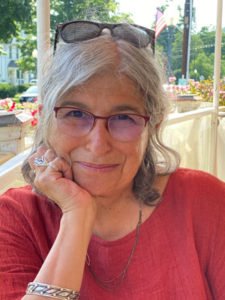The Passover Seder: The Eternal Journey from Bondage to Freedom
By Joyce Zonana,
“In each generation, each of us should personally feel as if we had gone forth from Egypt.”
So enjoins the Haggadah, the “telling” that announces the order for the Passover Seder, a ritual meal and recitation that commemorates the ancient Exodus from Egypt celebrated each year on the 15th of the Jewish month of Nissan—around the time of the Spring Equinox.
Because my family did personally go forth from Egypt, immigrating to the U.S. in 1951 when I was two, Passover always seemed especially numinous as I was growing up. And it still does today, as I plan to gather my dispersed family on Zoom—cousins and their children in England, California, Israel, and New York, along with my brother and his partner—to celebrate the eternally recurring, universal movement from bondage to freedom, darkness to light, winter to spring.
Part of Passover’s magic for me is its reliance on specific foods to symbolize elements of the story we tell and re-tell: matzoh for the unleavened bread our forebears hastily carried into the wilderness; bitter herbs to represent their suffering; salt water for their tears; charoseth for the mortar used in the bricks they labored to create. Ours is an embodied tale, a story we make real through repeated gestures of preparing and consuming these foods, identifying with our ancestors, reminding ourselves never to take for granted the freedoms we now enjoy.
I also love it that Passover invites personal reflection on and discussion of the meaning of this “telling” that has been handed down to us for centuries.” Its core remains constant, derived from the Book of Exodus, but interpretations and commentaries vary. There have been feminist and LGBTQ and Black Lives Matter and Justice for Palestinians Haggadot, each inviting us to reflect on the ways different peoples remain in bondage and in need of liberation. As we tell and re-tell our tale, we expand the meaning of “our,” acknowledging, incorporating, and joining ongoing struggles for freedom and justice.
It is from my family’s annual Seders that I acquired my love for focused, convivial discussion of a shared text—what inspired me to become a scholar and teacher of literature. In our Middle Eastern home, my father led the reading with the men at the table, always in Hebrew, that language I never learned, but which glimmered just beyond my grasp. My mother prepared the meal and set the table, making of it an altar to welcome the divine. Now that both my parents are gone, I’ve assumed both of their roles, preparing the food and leading the Seder. Ours was a household deeply marked by gender, and so I’ve had to learn—am still learning—to claim the authority once reserved for men. Such has been my own movement from bondage to liberation, from an “Egypt” of constriction to a “Promised Land” of freedom. That movement is never complete, always in need of renewal. And so, after this long year of COVID, we gather once more.
 Joyce Zonana, a regular contributor to the online journal Feminism and Religion, is a writer and literary translator. Her most recent translation is Tobie Nathan’s novel, A Land Like You, a celebration of Jewish life in Egypt in the first half of the twentieth century. She is also the author of a memoir, Dream Homes: From Cairo to Katrina, an Exile’s Journey.
Joyce Zonana, a regular contributor to the online journal Feminism and Religion, is a writer and literary translator. Her most recent translation is Tobie Nathan’s novel, A Land Like You, a celebration of Jewish life in Egypt in the first half of the twentieth century. She is also the author of a memoir, Dream Homes: From Cairo to Katrina, an Exile’s Journey.
“Seder Table,” Reprinted by permission of the artist, Deborah Saltz Amerling.

